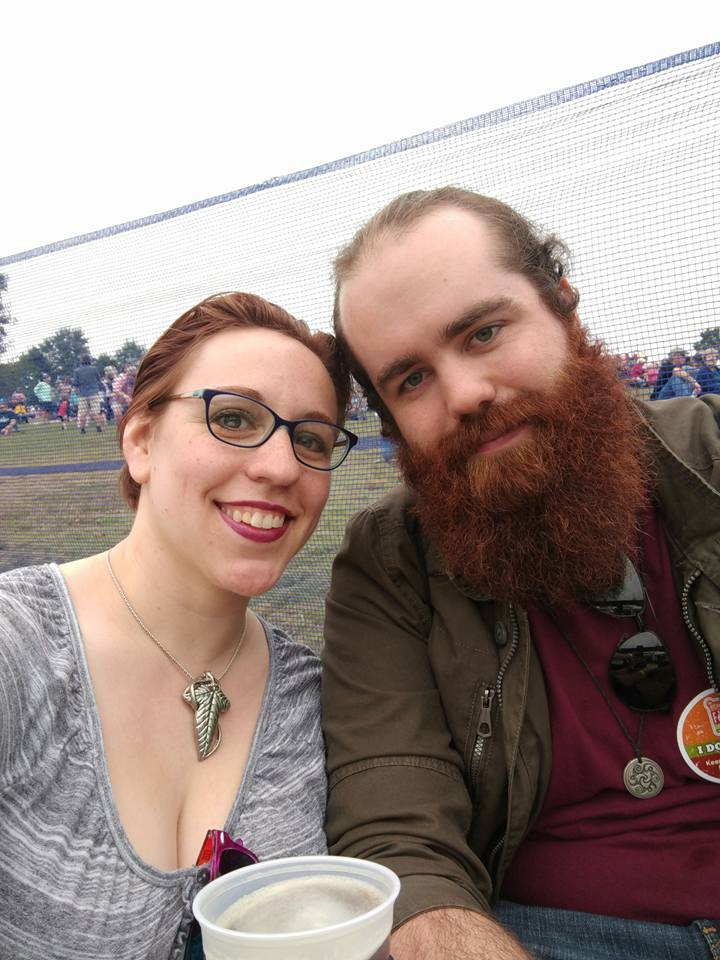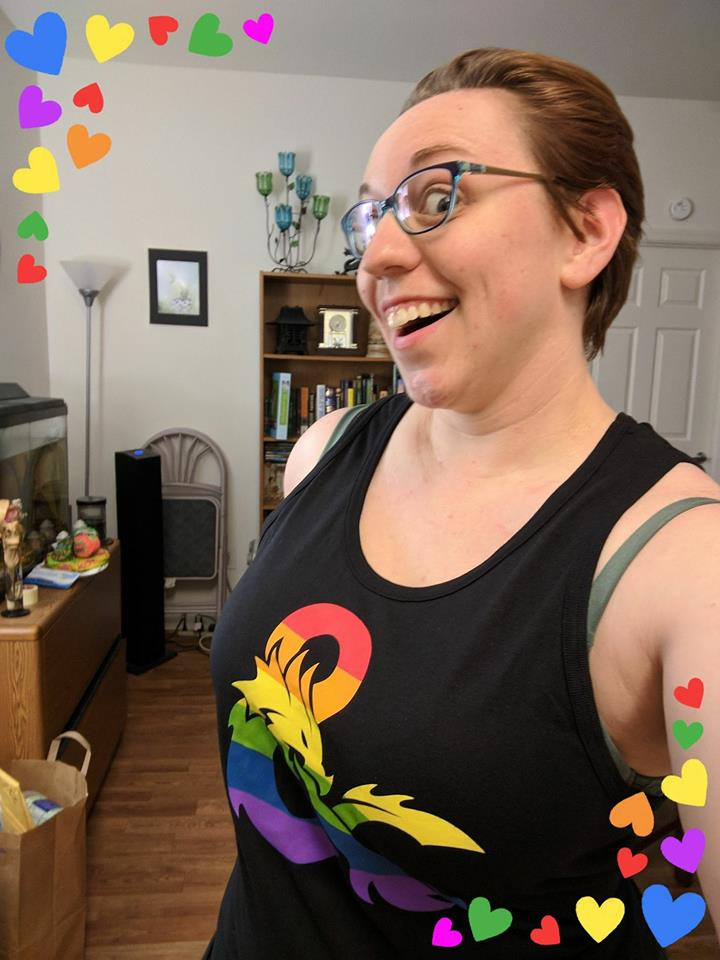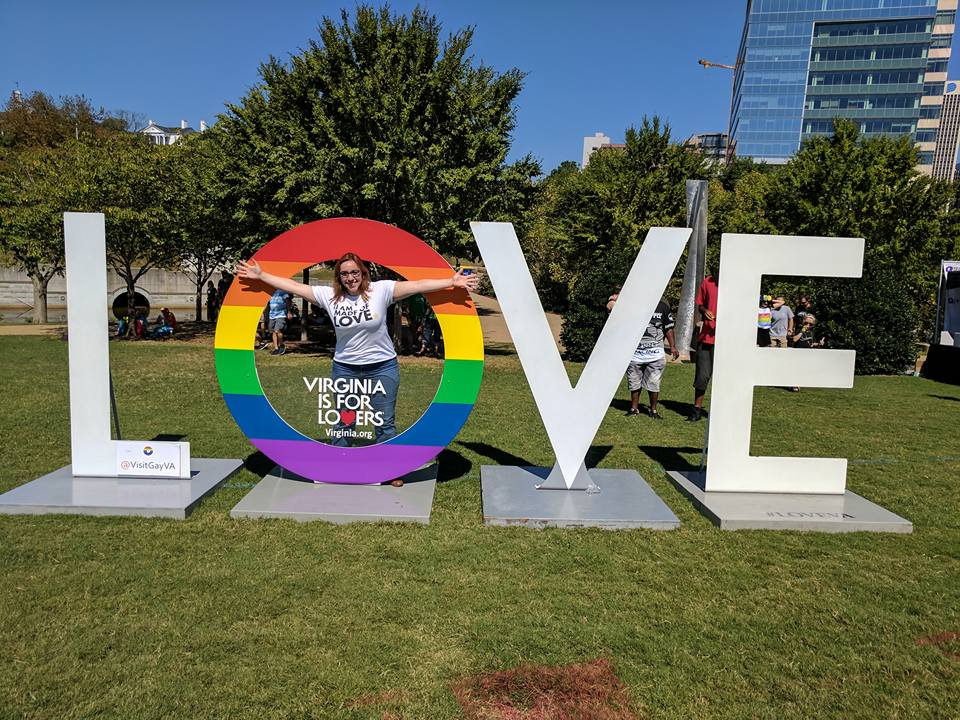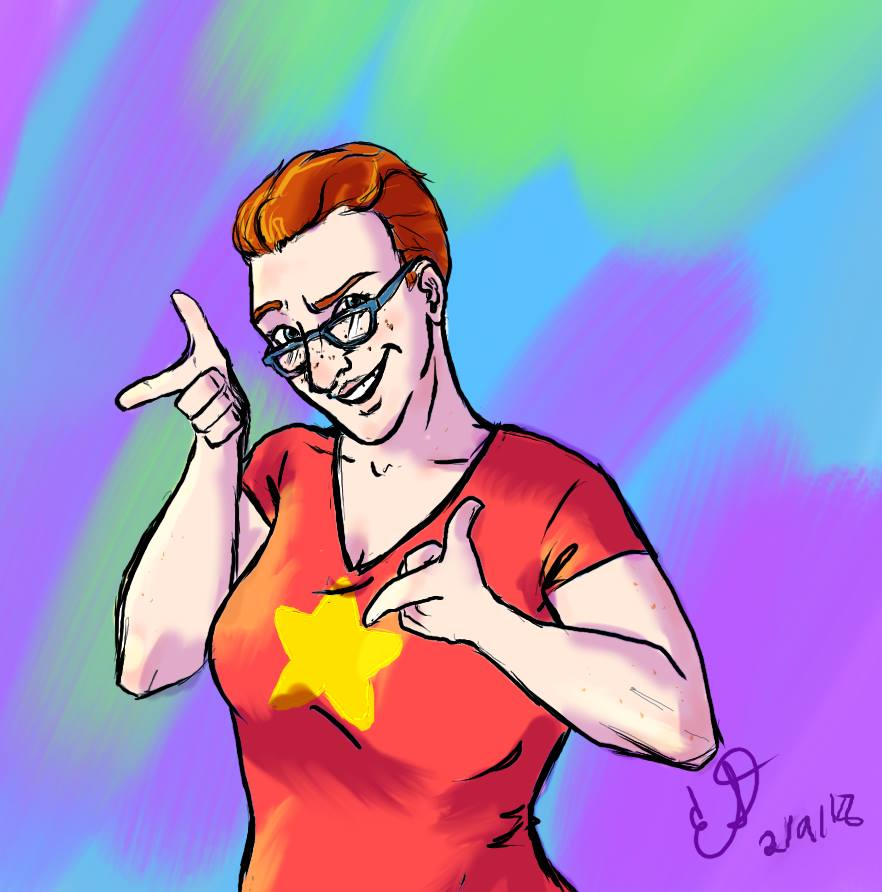Who is Michelle Nuckols?
Michelle Nuckols grew up in Mechanicsville, VA. She attended a Christian elementary school, was home-schooled during middle school and then attended a public high school. Her mother passed away when she was 14. Michelle works as a bank teller and is a cis-gender pansexual female. She has left the church and now considers herself an atheist. She is engaged to an Irish man. She is also an avid gamer, cosplay enthusiast, and fantasy illustrator/writer.
Excerpt from interview with Michelle Nuckols by Whitney Dow, 2018
Nuckols: [12:22:58] My name is Michelle. I am from Richmond, Virginia. I grew up in a small town just northeast of here called Mechanicsville [Virginia]. And I’ve traveled around, but I’ve pretty much just lived here my entire life and I am a bank teller at the moment. I also have another job, but I’m quitting that job like next week so it’s—I’ll be just a bank teller. And then I work, do art commissions for people online. I do little cartoons of—people ask me to draw —I’m a huge nerd and so I play a lot of like Dungeons & Dragons or like stuff like that and people like to invent characters and like to see their own characters realized, and so I illustrate people’s characters for them, basically, for money—actual money, like real dollars. That’s— [laughs]
...
I like to illustrate characters and I like to play and come up with my own characters and whatnot, too, and unless you say that someone is a particular, in describing someone, unless you say that they’re a particular minority background, the reader will assume that they are white, at least like ninety percent of the time. And that is a really strange phenomenon. [Laughs] But I guess it’s not that strange considering the history of it.
...
So I actually, and I worry about this a lot but I, I guess you just kind of have to do it anyway—I write as a lot of—I try to make my stories not all white people, so I write a lot of minority characters into it, depending on the thing. So I just thought it would be, think it would be really interesting to suddenly change perspective.
But I wish that I had—so just walking out of one door and becoming a different race is not going to be enough. Like I would want to have all the history and background that came with this, so like I could fully understand it. I wouldn’t just want to do it for the stupid novelty of it, because that’s woefully ignorant. But I would need to, you know, it would need to come with like the memories about growing up a certain way and like all this kind of stuff so that I wouldn’t, I would like to more understand exactly what that would mean. So, yes.
And I try to do that whenever I write as minority characters or like other genders or other, you know, sexual identities and stuff like that. I try to actually do the research to make sure that I do it correctly. Because I want to be respectful and I’m sure—just because everyone’s going to make mistakes when they don’t come from any background that they’re writing as, I’m sure I make mistakes. But I try to correct them and be open to criticism. [Laughs] For sure, so.
...
So how do the characters I make help me understand myself and my own identity? Okay. That’s absolutely is a thing that I—I have absolutely learned a lot about myself through playing other people, with different perspectives. Because I realize, oh, this person would react this way. This is different from how I would react. Why is that? And you know like—I absolutely changed a lot over the course of like three years of this one game play where I wanted to—it was just with friends and they wanted to try playing like basically as a black woman and like why that was different.
And that wasn’t the focus. Like she just happened to be black. But like she was from England and like a blacksmith [laughs] and I wanted to know like different—she was like a very brash character and very loud and would kind of rush into things and as that character learned about herself in the narrative, I learned about myself, too. Not in the same way, obviously, like just the different – playing as different characters absolutely teaches you, because you think about, why does this character feel this way? And then you go, well wait, no. Why do I feel this way? Why would I feel differently? And you absolutely spend a lot of time thinking about your own logic and thought processes and including your own background into things.
So it really helps—[laughs] putting yourself in someone else’s shoes helps you put on your own shoes, for sure. You actually think about lacing them instead of just putting them on, you know. So, yes. [Laughs]
...
No, and honestly like, there is something to be said that I do have the safety net of stepping back and becoming, you know, the white woman again. So you can jump in and do things and feel things that are very genuine, but then you still have that real life safety net and you have to—and it’s something I’ve thought about where it’s definitely made me understand that other people don’t have that same net and then you have to factor that into the respect of trying to play someone else. So you can’t play someone else with a different gender identity or a different racial identity and not be respectful of it.
You cannot just do it to be cool. That is the worst thing you could do. Because that character can’t back out of who they are and so you shouldn’t either. You should treat your characters like they’re real people that deserve respect as real people. You know, unless they’re obviously running just a satire, then it’s just silly. But like if you’re writing an actual story with a compelling narrative, you need to come up with characters that actually are essentially people, like real life people. So even if there’s some fictional element of them, like even they’re say like I don’t know, a vampire or something like that, then you still need to, okay, well, they were a person at one point. What were they like before they became a vampire?
How does that affect how they think now that they are? Do they think that because, do they feel guilty that they now have to eat people or they just think people are beneath them? Do they kind of just are like, no, this is just how it is now, like and how does that affect who they are as a person? Their morality and you know, stuff like that. So, yes.
Interview Transcript
Participant-Submitted Photos




